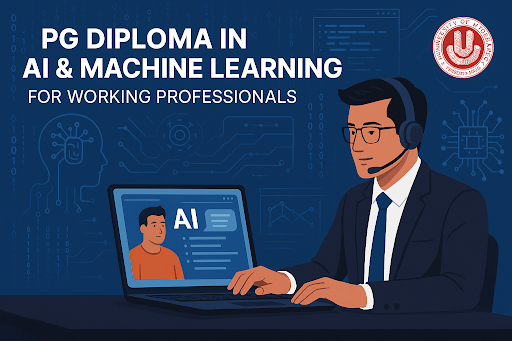Artificial Intelligence (AI) and Machine Learning (ML) are redefining how industries operate, offering data-driven solutions across sectors like finance, healthcare, logistics, and IT. A postgraduate diploma in artificial intelligence in India is designed to help professionals upgrade their technical skills, stay competitive in the job market, and contribute to AI-led transformations. These programs are ideal for those seeking to balance career growth with part-time or online learning.
Scope of Post Graduate Diploma in Artificial Intelligence in India
India has witnessed a growing demand for professionals trained in AI and ML technologies, especially in sectors like fintech, healthcare, e-commerce, and analytics. A PG diploma in AI and ML opens doors to roles that demand critical thinking, programming skills, and domain-specific applications of machine learning and data science.
Professionals with this qualification can work in AI product development, predictive analytics, intelligent automation, and NLP-based applications.
- The program’s applied orientation: Helps learners deploy algorithms in real-world settings.
- Target audience: It is a preferred choice for software engineers, data analysts, and IT managers looking to specialise in AI technologies.
- Curriculum strength: The structured curriculum helps build a strong conceptual and practical foundation, which is crucial for deploying AI models effectively in business environments.
PG Diploma Course Details at University of Hyderabad (CDVL)
One of the most reputed options for this domain is the AI ML Diploma Course offered by the Centre for Distance and Virtual Learning (CDVL), University of Hyderabad. The program is designed to accommodate the learning needs of working professionals.
- Duration: 1 year
- Mode: Distance learning with flexible online components
Core Subjects:
- Foundations of AI: This subject introduces the fundamental concepts of Artificial Intelligence, covering its evolution, techniques, and application domains. Learners explore topics such as intelligent agents, search algorithms, knowledge representation, inference, and problem-solving strategies. It sets the conceptual groundwork for understanding how machines can simulate human intelligence.
- Python for Machine Learning: Python is the most widely used language in AI and ML. This subject focuses on Python programming with an emphasis on libraries like NumPy, Pandas, Scikit-learn, and Matplotlib. Students learn to manipulate datasets, implement algorithms, and build models in a hands-on environment, preparing them for practical machine learning applications.
- Deep Learning Techniques: This module delves into neural networks and deep learning architectures such as CNNs (Convolutional Neural Networks), RNNs (Recurrent Neural Networks), and GANs (Generative Adversarial Networks). Students gain knowledge of model training, activation functions, backpropagation, and using frameworks like TensorFlow or PyTorch for designing scalable deep learning models.
- Natural Language Processing: NLP equips learners with the tools to process and analyse human language data. The subject covers syntax, semantics, sentiment analysis, text classification, named entity recognition (NER), and language modelling. Applications include chatbot development, voice-based assistants, and text analytics engines.
- AI Project Implementation: This capstone subject guides students through the end-to-end development of an AI project. From problem formulation and data preprocessing to algorithm selection, model training, evaluation, and deployment, students apply what they’ve learned to a real-world or industry-simulated use case, often resulting in a portfolio-worthy outcome.
This AI and ML course in Hyderabad combines academic excellence with industry-relevant skills, making it ideal for upskilling without a career break. The CDVL’s curriculum reflects both theoretical rigour and project-based learning.
Who Should Apply: Eligibility & Target Audience
The eligibility for the program typically includes a Bachelor’s degree in Engineering, Computer Science, Mathematics, or related disciplines. Some institutions may also accept candidates from other domains if they have work experience in analytics or programming.
- Diploma Duration: A diploma in AI and ML duration is generally 12 months, offering sufficient time to absorb complex topics while managing work responsibilities.
- Ideal candidates: Software engineers, system analysts, data professionals, and academic researchers who wish to specialise further.
- Inclusive access: Non-CS graduates with coding proficiency and mathematical aptitude may also benefit from this course format.
This academic pathway caters to learners who need flexibility but are committed to developing core competencies in intelligent systems and automation.
Job Prospects After PG Diploma AI & ML
Completing an AI and machine learning diploma course positions learners for mid to senior-level roles, depending on their prior experience. Employers are actively hiring candidates who can lead AI implementation projects and translate business problems into technical solutions.
- AI Engineer: Builds ML models, develops algorithms, and optimises systems for smart decision-making.
- Data Scientist: Interprets large datasets using AI models to extract actionable insights.
- Machine Learning Specialist: Designs and deploys ML applications for domain-specific use.
- Business Intelligence Analyst: Uses predictive models for strategic decision-making.
- NLP Engineer: Works on voice recognition, chatbots, and sentiment analysis tools.
The demand for such professionals is expected to grow exponentially, making this diploma a strategic step for those pursuing long-term careers in AI.
Conclusion
A Postgraduate Diploma in Artificial Intelligence in India is more than a credential—it’s a gateway to shaping the future. As industries transition towards intelligent automation, the need for skilled AI professionals will only increase. This diploma empowers working individuals to stay ahead of the curve without interrupting their careers. With the right academic foundation and applied skills, learners can take on leadership roles in tech innovation, product development, and strategic decision-making.
Whether you're looking to shift your career into AI or deepen your expertise in machine learning, this program offers a well-rounded path to meaningful, future-ready employment.




